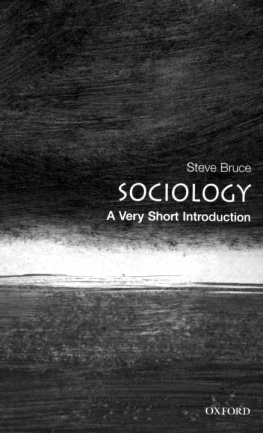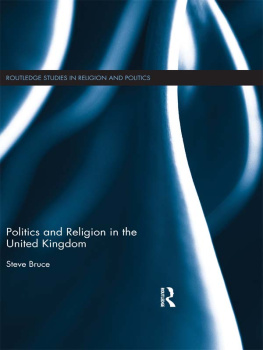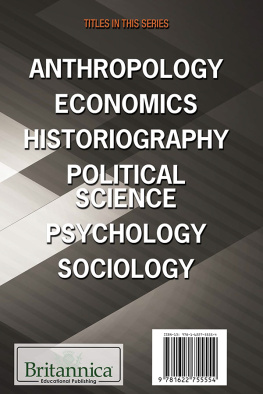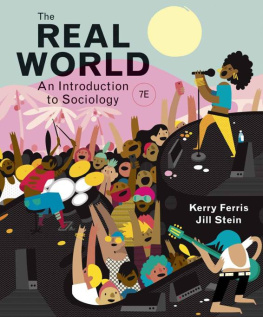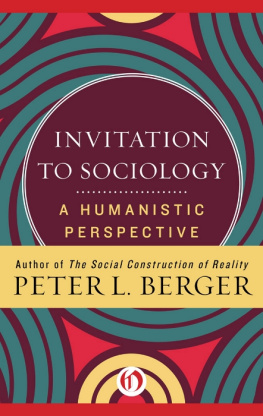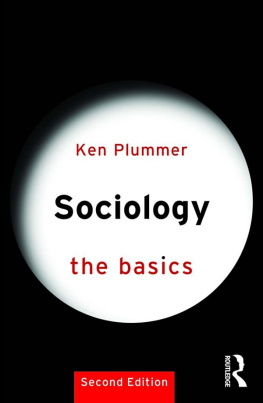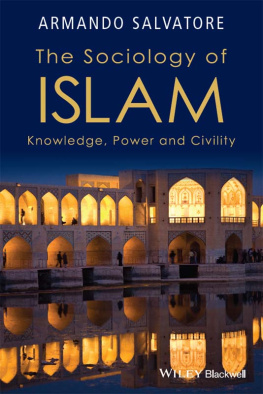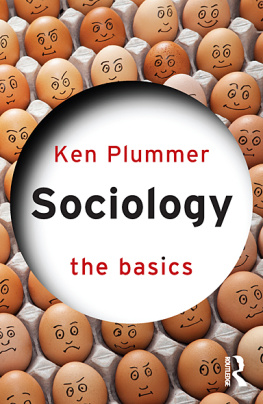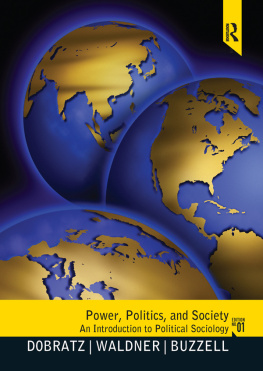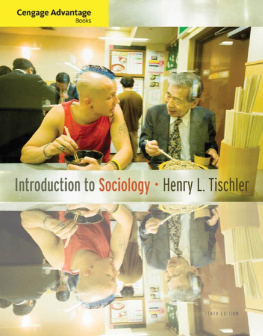Sociology: A Very Short Introduction
VERY SHORT INTRODUCTIONS are for anyone wanting a stimulating and accessible way in to a new subject. They are written by experts, and have been published in 15 languages worldwide.
Very Short Introductions available from Oxford Paperbacks:
ANCIENT PHILOSOPHY Julia Annas
THE ANGLO-SAXON AGE John Blair
ARCHAEOLOGY Paul Bahn
ARISTOTLE Jonathan Barnes
AUG U STI N E Henry Chadwick
THE BIBLE John Riches
BUDDHA Michael Carrithers
BUDDHISM DamienKeown
CLASSICS Mary Beard and John Henderson
CONTINENTAL PHILOSOPHY Simon Critchley
DARWIN Jonathan Howard
DESCARTES Tom Sorell
EIGHTEENTH-CENTURY BRITAIN Paul Langford
THE EUROPEAN UNION John Pinder
FREUD Anthony Storr
GALI LEO Stillman Drake
GANDHI Bhikhu Parekh
H E I D EGG E R Michael Inwood
HINDUISM Kim Knott
HISTORY John H. Arnold
H UM E A. J. Ayer
INDIAN PHILOSOPHY Sue Hamilton
INTELLIGENCE Ian Deary
ISLAM Malise Ruthven
JUDAISM Norman Solomon
1 U N C Anthony Stevens
THE KORAN Michael Cook
LITERARY THEORY Jonathan Culler
LOGIC Graham Priest
MACH IAVELLI Quentin Skinner
MARX Peter Singer
MEDIEVAL BRITAIN John Gillingham and Ralph A. Griffiths
MUSIC Nicholas Cook
NI ETZSCH E Michael Tanner
NINETEENTH-CENTURY BRITAIN Christopher Harvie and H. C. G. Matthew
PAUL E. P. Sanders
POLITICS Kenneth Minogue
PSYCHOLOGY Gillian Butler and Freda McManus
ROMAN BRITAIN PeterSalway
SOCIAL AND CULTURAL ANTHROPOLOGY John Monaghan and Peter Just
SOCIOLOGY Steve Bruce
SOCRATES C. C. W. Taylor
STUART BRITAIN John Morrill
THEOLOGY David F. Ford
THE TUDORS John Guy
TWENTIETH-CENTURY BRITAIN Kenneth O. Morgan
WITTGENSTEIN AnthonyGrayling
Visit our web site for news of forthcoming titles

Steve Bruce
SOCIOLOGY
A Very Short Introduction




Contents
Preface
It is a sign of the power of sociology that it is both popular and reviled. Longer established academic disciplines deride it as a gauche newcomer but adopt its perspectives. Ordinary people mock those who pursue it professionally, yet take some of its assumptions for granted. Governments accuse the discipline of undermining morality and social discipline, yet hire sociologists to evaluate their policies.
Our uneasiness with the discipline can be seen in the frequency and the nature of the jokes. This may just be my professional paranoia, but it seems that there are sociologist jokes in a way that there are not historian jokes. As such humour does not translate terribly well I will recount just one. This gem came from the British television series Minder, a fine 198os comedy of minor villains and London low life. Two lovable rogues are discussing a mutual acquaintance who has just been released from prison. One announces that their friend has been improving himself while inside by studying: 'Yeh. He's got an Open University degree now. In sociology.' The second asks: 'Has he given up the thieving then?' and the first replies: 'Nah! But now he knows why he does it!'
This is a complex jibe: sociology appeals to villains (presumably because its focus is social problems); sociology, by showing the social causes of individual action, absolves people of responsibility; sociology is naive and can be manipulated by the worldly-wise. Whether the discipline is guilty of any or all of these charges should be clear by the end of this short introduction.
For reasons that will become apparent, social scientists find it harder to agree than do natural scientists. Researchers at the leading edge of physics, for example, may argue ferociously, but there is sufficient consensus among the discipline's journeymen for an introductory physics textbook to state with authority the basic knowledge that is accepted by the trade. In contrast, introductory social science texts often describe their subjects as a series of competing perspectives. There are benefits to stressing what divides us. By taking specific emphases to their logical conclusions, we can readily perceive the arguments that need to be resolved if we are to explain this or that facet of the social world. Like politicians in elections, advocates of particular schools try to put 'clear blue water' between themselves and their rivals. But, like politicians in power, when the same advocates get round to doing sociology (rather than just advertising their brand of it) they tend to fall back to a common middle ground.
The narrow constraints of this 'Very Short Introduction' format free me from the obligation to map the discipline comprehensively. Instead I will try to convey the distinctive essence of the sociological vision. This will be done in three stages. First, I will explain the status of the enterprise by considering what is meant by describing sociology as a social science. In Chapters 2, 3, and 4 I will try to explain some of its fundamental assumptions. In the final chapter I will try to clarify the sociological enterprise by ridding it of some unfortunately popular impostors.
Acknowledgements
I would like to thank Professor Gordon Marshall of Nuffield College, Oxford, and George Miller of Oxford University Press for suggesting that I write this book. Professor Marshall, Professor Steven Yearley of the University of York, and Dr David Inglis of Aberdeen's Sociology Department, were kind enough to comment on early drafts. As always, Hilary Walford's copy-editing will have ensured that I have not said anything I did not mean to say.
Chapter
The Status of Sociology
Sociology and science
For as long as we have been impressed by our understanding and control of the material world, scientists and philosophers of science have tried to specify just what distinguishes successful modern science from such dead ends as trying to produce gold from stone or reading our future in the stars. Unfortunately all such attempts have failed to produce unambiguous lines of demarcation, and, when we have looked closely at what real scientists actually do, we often find that the working life of science fails to match the picture painted by the philosophers. None the less we can list a series of characteristics that are more likely to be found in astronomy than astrology, for example. While we cannot with absolute certainty divide ideas about the material world into science and pseudo-science, we can still profitably talk about things being 'more or less' scientific.
A good starting point is to assert that any good scientific theory should be internally consistent. This immediately separates it from much of what passes for lay reasoning. My mother contradicted herself more often than not. That something she said one moment was incompatible with her next pronouncement hardly ever troubled her. She once criticized a roadside cafe by asserting that the food was vile and the portions were too small!
A good scientific theory should accord with the evidence. This may seem obvious, but what the scientist should demand in this respect is considerably more rigorous than that which the lay person habitually accepts. Very different standards operate, for example, in conventional and in alternative medicine. Although driven by commercial imperatives to get their new wonder drugs to the market before those of their rivals, pharmaceutical companies subject their products to lengthy and extensive trials. In `double-blind' testing, large numbers of patients are divided into test and control groups. One is given the new drug; the other a harmless and inert `placebo'. Until the allocations are revealed at the end of the trials, neither patients nor doctors know who is getting the real drug and who the placebo. Only if the test sample shows a marked improvement over the placebo group is the trial accepted as good evidence of the effectiveness of the drug. In contrast, alternative therapies such as faith healing, acupuncture or magno-therapy are rarely tested; the personal experience of the practitioner, supported by a few anecdotes of miracle cures, is taken to be sufficient to establish effectiveness. Such testing as takes place is never double-blind, and thus the possibility that any perceived benefits result from a placebo effect is never eliminated.

